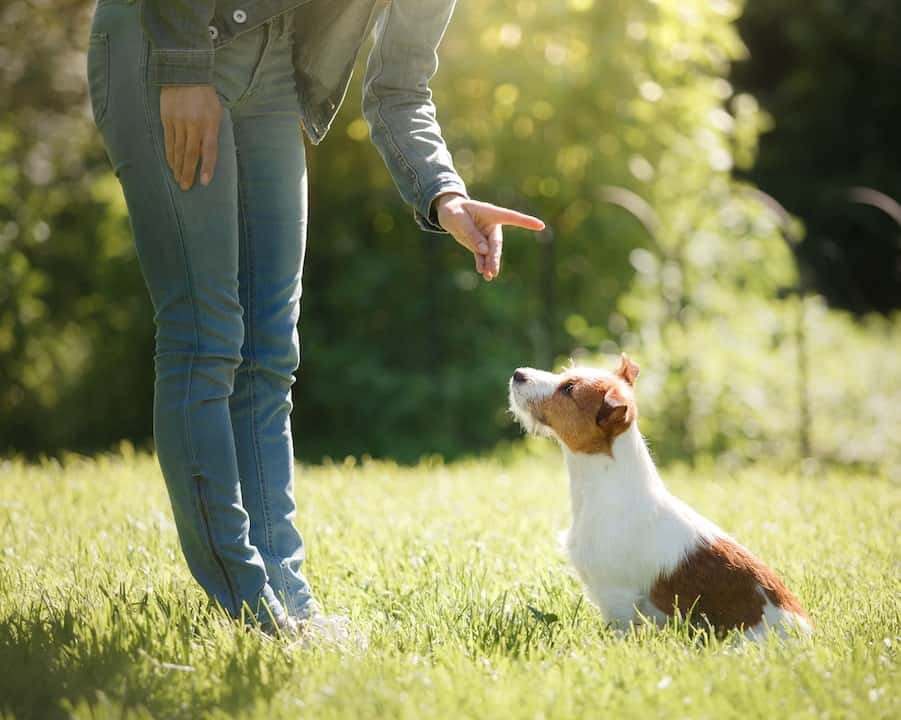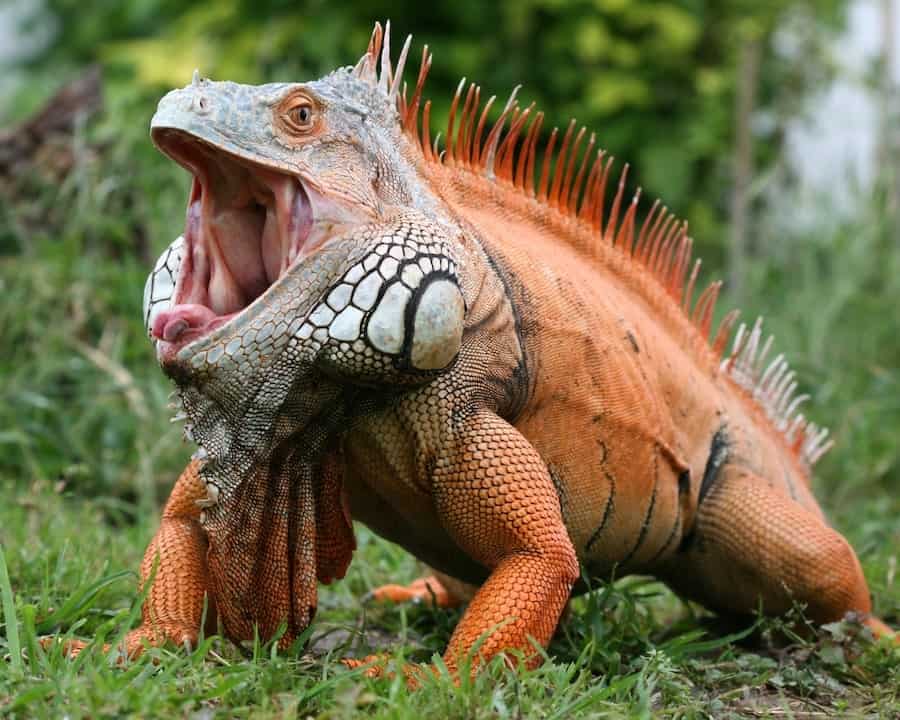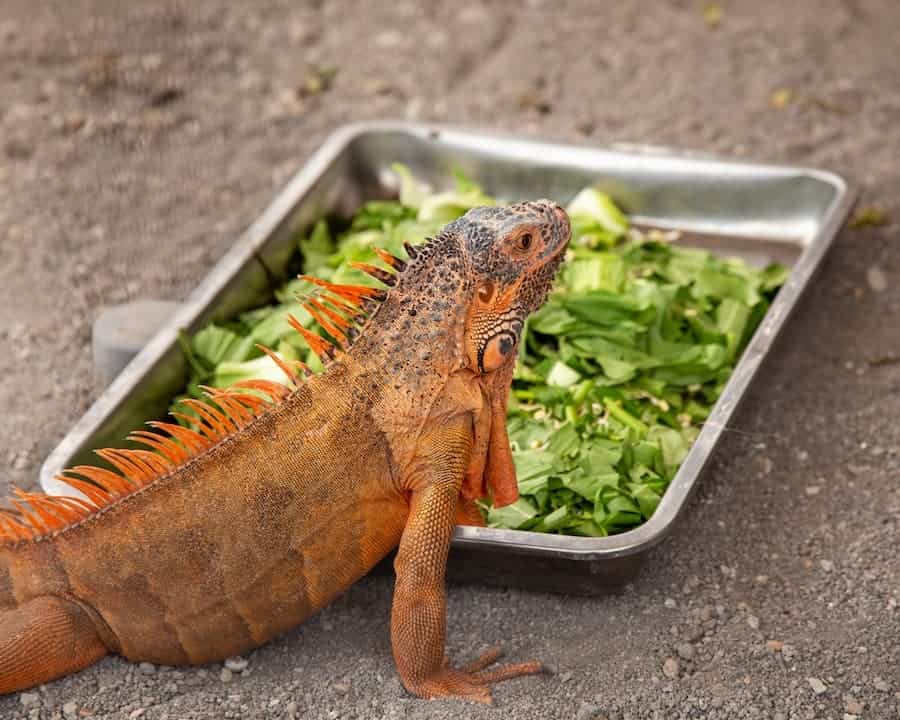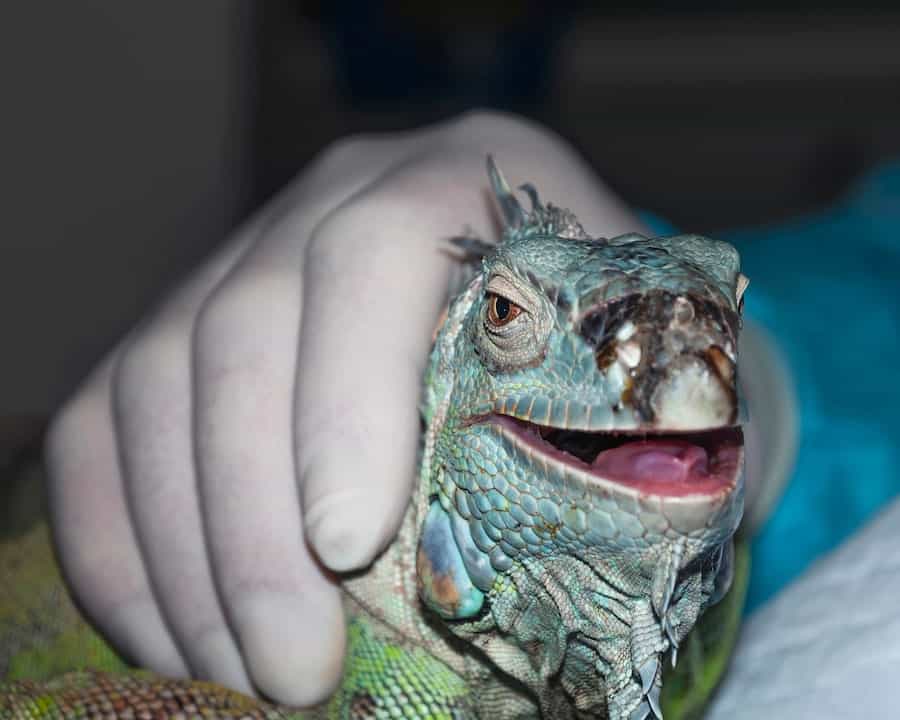Has your iguana stopped eating? It’s natural to be concerned when pets stop eating because this is often one of the first signs of illness. But your iguana may not be eating for many other reasons, too.
Iguanas may lose their appetite because they are sick, stressed, in a new environment or feeling threatened. Improper lighting and temperature conditions can also cause an iguana to stop eating.
If your iguana isn’t eating, the points below may help you uncover the reason why.
1. Your Iguana is Sick

The most obvious reason your iguana may not be eating is because it’s sick. When iguanas lose their appetites, it’s often because of parasites or other illnesses, such as Salmonella.
If illness is the culprit, there will likely be other noticeable symptoms, such as:
- Lethargy
- Swelling
- Signs of physical discomfort
Because illness is one of the most serious reasons for loss of appetite, it’s important to consult with your vet as soon as the problem arises. The faster your iguana gets treatment, the quicker he can get back to his old self.
2. Your Iguana Isn’t Receiving Proper Lighting

Improper lighting can also affect your iguana’s eating habits. If the lights are too dim, for example, your iguana may not be able to properly see its food, causing it to skip a meal.
If your iguana isn’t getting enough UV exposure, it can also develop metabolic bone disease (MBD). MBD can affect an iguana’s appetite.
Iguanas also need UVB rays for proper digestion. It’s not uncommon to see these lizards basking after they’ve eaten a meal because it helps with digestion.
Check your iguana’s lighting situation to ensure that he’s getting 12 hours a day and the right amount of UV light.
Need help with your lighting setup? I wrote a post titled, “Cost of Owning an Iguana in 2022 and How to Save,” which covers lighting.
3. Your Iguana is Stressed

Stress is another common reason why iguanas lose their appetites. Many animals, including humans, have no interest in eating when stressed. The body goes into fight or flight mode, and digestion is the last thing the body wants to do in this state.
Iguanas can become stressed for a number of reasons:
Their Environment or Routine Has Changed
Iguanas are creatures of habit. Any changes to their environment or habits can cause stress. In fact, many of the reasons on this list are related to environmental or routine changes.
An iguana may not eat for a day or two if there are abrupt changes to its usual schedule.
They’re Not Used to Being Handled
Handling can also be stressful for iguanas that aren’t used to or comfortable with it.
It’s important to start working on training early on so that handling does not become a stressful, appetite-suppressing event for your pet.
Improper Lighting in the Enclosure
An iguana’s enclosure should mimic its natural habitat. Along with needing a warm environment, iguanas also need 12 hours of sunlight per day.
Improper lighting can throw this delicate balance out of whack and lead to all kinds of complications.
Along with reduced appetite, your iguana may also struggle to regulate its body temperature and may develop illness if the issue isn’t addressed.
These are just a few of the many reasons why iguanas get stressed.
How can you tell if your iguana is stressed? Check out my post “15 Signs an Iguana is Stressed and What to Do About It” for additional signs.
4. Your Iguana Feels Threatened by Another Pet

Iguanas can suffer from acute stress and become uninterested in food for a day or two. But if there’s a chronic source of stress, like another pet or iguana, your iguana may struggle to regain its appetite.
If you just brought home a new iguana or you have a large dog in your home, your iguana may get stressed out and stop eating.
Separating your iguanas and keeping other pets away from the enclosure can help eliminate this source of chronic stress.
5. Your Iguana is Suffering From Impaction

Impaction is a serious concern for iguana keepers, and it’s one that can happen quite easily. It occurs when there’s a blockage in the digestive system, which leads to constipation.
Impaction can be caused by:
- Gravel, sand and soil. If these materials are used as a substrate, the iguana may ingest them and suffer from impaction.
- Vermiculite, pumice and perlite (common plant soil additives). If plant soil is used as a substrate, the iguana may ingest these materials and suffer from impaction.
- Hairballs. If you have furry pets in the home, hair can lead to impaction. For example, if an iguana spends time outside of his enclosure, he may eat hair on the floor or carpeting.
It’s easy to see why impaction can make an iguana uninterested in food. However, this is a serious issue that needs to be addressed quickly.
If you think impaction may be causing your pet’s appetite problems, contact your vet right away.
6. Your Iguana’s Cage is Too Cold

If your iguana has lost its appetite, it may be because its enclosure is too cold. Cooler temperatures inhibit an iguana’s digestion, making them uninterested in food.
Along with losing their appetites, iguanas also become more lethargic when their environment gets too cold. This is why it’s so important to have a temperature-controlled environment for your iguana.
7. Your Iguana’s Cage is Too Hot

Alternatively, your iguana may lose its appetite if its enclosure is too hot. If overheating is the problem, your iguana may also:
- Pant
- Keep its mouth open
- Feel hot to the touch
- Be extra lethargic
Overheating can quickly become life-threatening. Removing your iguana from the heat and placing him in a cooler environment will allow him to cool down naturally.
His appetite should return once his body temperature is back to normal. However, you will need to address the lighting and temperature situation to prevent this scenario from happening again.
8. Your Iguana is Dehydrated

A dehydrated iguana will have a much harder time digesting his food and may have a poor appetite. You can encourage drinking by replacing his bowl with fresh, clean water regularly.
You can also offer wet food to properly rehydrate him.
Additionally, you will want to verify that the heat and humidity levels are adequate and are not causing him to dehydrate.
9. Your Iguana is Shedding

Although it’s not a common response, some iguanas lose their appetites during the shedding process.
Most iguanas go through this process without any behavioral changes, so keep in mind that this is not a likely cause of your lizard’s lack of appetite.
However, if you rule out all possible causes (including medical causes), then shedding may be the culprit.
10. It’s Mating Season For Your Iguana

An iguana’s eating habits can be all over the place during the breeding season. Males and females can both suffer from loss of appetite during this period.
Some iguanas may eat less food, not eat for just a few days or just refuse to eat, period.
Sexually mature females may also have a weak appetite during breeding season due to hormonal changes.
Female iguanas can produce eggs with or without a male.
As their eggs grow, they take up more room inside of the body – room that’s normally needed for digestion. With less room for the digestion process, she may be less inclined to follow her normal feeding routine.
11. Your Iguana is New to Its Environment

Iguanas really love their routines, and they’re not too fond of change, especially changes to their environments. Your iguana may not be interested in eating if you’ve:
- Just brought him home and he hasn’t adjusted to his new surroundings
- Moved to a new house
- Just built a new enclosure
- Moved him to a smaller enclosure
- Moved the enclosure to a new spot in the house
Moving your iguana’s enclosure just a few feet away from its original location is enough to stress him out and make him lose his appetite.
12. There is a Change in Your Iguana’s Routine

If your iguana isn’t eating, it’s important to consider recent events that may have triggered this behavior. Were there any changes to your iguana’s routine?
- Are there new people feeding your iguana?
- Have you changed your iguana’s feeding time?
Although these lizards get stressed and upset about changes to their routines, they adapt quickly and should regain their appetites.
13. Your Iguana is Already Full

When was the last time your iguana ate? The VCA Animal Hospital notes that young iguanas need to eat daily to grow at a healthy rate. Meanwhile, adult iguanas may not eat daily and will eat every other day.
Often, when your iguana needs to get his weight under control, the vet will recommend feeding every other day.
I do want to mention that if he normally eats daily, you’ll want to review any new additions to his diet. Iguana pellets are known for making iguanas feel very full and may be the culprit.
Otherwise, a quick examination from the vet to rule out compaction will provide you peace of mind and verify if your pet is full or not.
14. Your Iguana is Injured

Injuries affect every iguana differently. For some iguanas, if they’re injured, they may not have the energy or feel well enough to eat. You’ll want to monitor him at this time and contact a vet if his condition doesn’t improve.
Nutrition is a major part of the healing process, so he will need to eat to get better.
This reminds me of an article I wrote about iguanas dropping their tail. Most iguanas will regrow their tail, but they need a ton of energy for this process.
If your pet is hurt and not eating, the injury may be more severe than you thought.
15. Your Iguana is Deficient in Vitamins or Minerals

Nutrition is important for every living reptile, including your iguana. If your iguana is deficient in key vitamins and minerals, it may not feel like eating.
One study shows that if you don’t supplement your iguanas’ salads properly or if they lack legumes, they may become deficient in:
- Vitamin D
- Calcium
Absorption rate for calcium may also be impaired, which can lead to serious health risks. Your veterinarian can perform an analysis of your reptile to ensure he’s not deficient in vitamins or minerals.
Vitamins and minerals are very important in keeping your iguana healthy. I recommend reading a post I wrote titled, “11 Signs of a Healthy Iguana,” to identify if your iguana seems healthy or not.
What do I do if My Iguana Won’t Eat?
An iguana that is not eating should be immediately checked by a veterinarian. If a medical issue is affecting the lizard’s appetite, the vet will be able to provide treatment and a management plan.
If your iguana is simply being a picky eater, James Hatfield, author of “Green Iguana The Ultimate Owner’s Manual,” suggests using a food processor. A food processor will allow you to blend foods they don’t like in with the ones they do like to make meals more enticing without sacrificing their nutrition.
Here are a few other possible solutions if your iguana isn’t eating:
- Adjust the enclosure’s temperature and lighting. You may need to change your setup to create a temperature-controlled environment.
- Remove cagemates or keep pets away from the enclosure.
- Try giving your iguana a warm bath to stimulate its appetite.
If you and your veterinarian find that nothing is working, force feeding may be necessary to save your iguana’s life.
How Long Can Iguanas Live Without Eating?

An iguana can live several weeks without eating if it is healthy to begin with. Many iguanas will show signs of deteriorating health after 2 weeks without food.
If your iguana is not eating, it’s important to determine the cause of its loss of appetite as quickly as possible and take steps to correct the problem right away.
How Many Times a Day do Iguanas Eat?

Adult iguanas should be fed once per day. Hatchlings and young iguanas should be fed at least twice per day. Some adult iguanas can be fed every other day.
Ideally, you should feed your iguana around the same time every day to establish a routine. Remember that iguanas love routines. If their feeding schedule is predictable, they’ll be less likely to have appetite issues.
The points above outline the most common reasons why your iguana may not be eating. However, if you’re concerned for your pet, it never hurts to have the veterinarian examine him for peace of mind.

